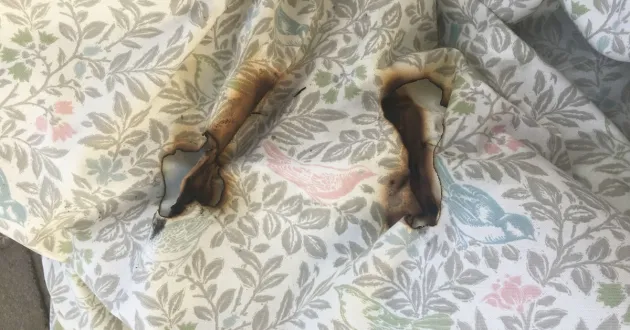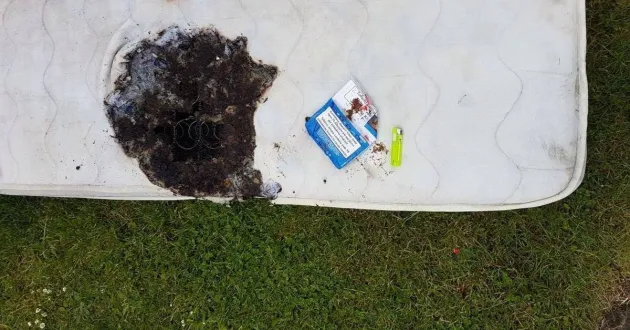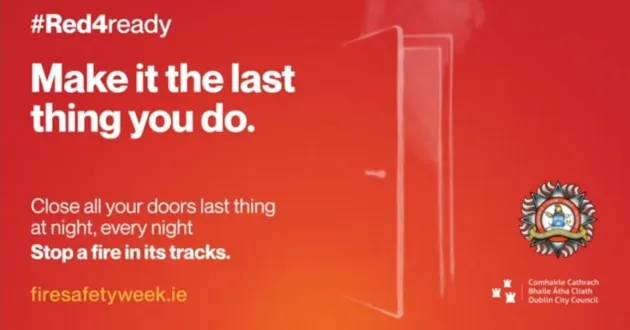Essential Fire Safety for the Home
Discover Dublin Fire Brigade's advice and guidance for fire safety in the home, including key prevention steps and risks to be aware of.
On average, 36 people die from fires in Ireland every year. Sadly, the majority of these fatalities occur in domestic settings.
To help you stay safe, here are Dublin Fire Brigade's tips for reducing the risk of fire in your home.
The Three Golden Rules
- Install smoke alarms to give early warning and test them regularly.
- Prepare an evacuation plan and practice it regularly.
- Look around and eliminate hazards.
Key Steps for Fire prevention
These are the key actions that you should keep in mind every day to minimise the risk of fire in your home.
- Don’t leave children alone in a house, caravan, mobile home or car.
- Always keep matches and lighters out of children’s reach.
- Fit smoke alarms in your home and test them regularly.
- Have fire extinguishers and/ or fire blankets visible and know how to use them.
- Do not use open chip pans.
- Always use a spark guard on open fires, especially before going to bed or if children are around.
- Plan escape routes and practise fire drills. (Find more information on evacuation plans below.)
- Ensure all escape routes are clear and, if your exit requires a key, ensure it is easily available.
- Close all doors, especially from the kitchen and living room.
- Take special precautions during holiday periods as they can present additional fire safety risks; read our pages on fire safety tips for Halloween and fire safety tips for Christmas for further guidance.

More Information on Smoke Alarms
Smoke will not wake you up, in fact, it will make you sleep more deeply, so smoke alarms are very important for early warning and providing time for you to safely get out of the house.
You should have a smoke detector located in:
- Escape routes - place one in every corridor, landing and stairway.
- Every bedroom.
- Other high risk rooms, including living rooms, garages and utility rooms.
- The kitchen should also have a heat detector to avoid false alarms.
Smoke and heat alarms can be connected to the mains power supply or battery operated. All the alarms in your house should be connected so, if a fire is detected in one room, all of the alarms will sound. They should also be tested weekly.
Carbon Monoxide Alarms
Often called the silent killer, carbon monoxide is an invisible, odourless, colourless gas created when fuels burn incompletely. In the home, heating and cooking equipment can be sources.
Dublin Fire Brigade asks the public to remember three things to protect against this silent killer:
- Remember the causes: Carbon monoxide can be produced when any fuel is burned, including oil, gas, wood, coal and turf.
- Remember to service: To prevent carbon monoxide, ensure your appliances are installed and serviced annually by a registered gas installer or a qualified service agent. Make sure vents, flues and chimneys are kept clear too.
- Remember the alarm: Install an audible carbon monoxide alarm, which complies with EN 50291, carries a CE Safety Mark, has an end of life indicator and carries an independent certification mark.
Fire Hazards to Look Out For at Home
The likes of smoking and electrical appliances present fire risks that can be avoided by taking some extra precautions.
Precautions for Smokers
- Don’t smoke when you’re tired, especially when in bed or relaxing in a chair.
- Always use a large, stable ashtray, because a burning cigarette end can smoulder for hours before igniting and spreading.
- Always extinguish cigarettes fully and empty ashtrays before going to bed, but make sure the contents are fully extinguished before disposing of them.

Precautions for Electrical Items
- Use electrical items carefully and store them properly when they are not in use.
- Don’t overload sockets or use double adapters.
- If electrical cables or plugs are damaged or worn, contact an electrician.
- Be wary of hot electrical items like toasters, irons, bulbs, electric blankets, radiators and chargers. Check electric blankets regularly for wear and tear. If they are damaged or over three years old, get rid of them.
- Get a qualified electrical contractor to carry out installation and repairs to electrical appliances and fittings.
- Make sure all items used in the home have a CE European Safety Mark indicating that they meet expected safety standards.
- Switch off and unplug all non-essential appliances when they are not in use.
- Unplug phone chargers too.
- Check all leads and plugs for fraying or burning and replace if necessary.
Tips for Safe Storage
- The likes of rubbish and newspapers should be stored appropriately and should not be allowed to build up as this could pose a fire hazard.
- Flammable materials, such as paints, solvents, adhesives and chemicals, should not be stored in your home.
- Do not leave newspapers, clothes or other materials too close to fires or heaters.
Make an Evacuation Plan
By planning and practising how to get out of your home with your family, you can be more confident about a safe escape in the event of a fire.
Having an evacuation plan is especially important if you, or someone living in your household, could find it difficult to escape without assistance. The elderly are particularly at risk and represent the highest percentage of fatalities that occur in home fires.
Here is a step-by-step guide for making an evacuation plan for your home:
- Plan out two escape routes to get out of the house.
- Keep these escape routes clear and free of obstacles.
- Always ensure that keys for doors and windows are readily available.
- Practise the plan.
- Close all doors behind you as you leave.
- Crawl low in smoke as the air is cleaner at ground level.
- Do not re-enter the house for any reason.
- Phone the Dublin Fire Brigade as soon as possible.
If you can't carry out your evacuation plan in the event of a fire, here are some additional tips to keep in mind:
- If you are trapped in a room, close the door and seal the bottom of the door with a towel or blanket.
- Go to the window and try to attract the attention of someone outside.
- At first floor level, as a last resort, you can hang from the window sill and drop to the ground. However, always lower children to the ground first. Never expect them to follow you.

Home Fire Safety Checklist
This checklist only takes a couple of minutes to complete, but it could mean the difference between life and death if a fire occurs.
Walk around your house, checking off the following list:
- Are all unnecessary electrical appliances unplugged?
- Are all unnecessary gas appliances turned off?
- Are all candles and naked flames extinguished?
- Is there a spark guard in front of any open fires?
- Have all ashtrays been emptied?
- Are all escape routes completely clear of obstructions?
- Are all doors closed to reduce the spread of fire and smoke?
It's also important to test your smoke and carbon monoxide alarms weekly. Follow Dublin Fire Brigade on social media to get #TestItTuesday reminders.
Dublin Fire Brigade's Fire Prevention Programmes
Making Dublin safe from fires and other emergencies is at the heart of what we do. Dublin Fire Brigade runs a number of fire safety programmes, which aim to get the community involved in the prevention of fires.
If you would like a fire officer to talk to your school, business or community, get in touch below.